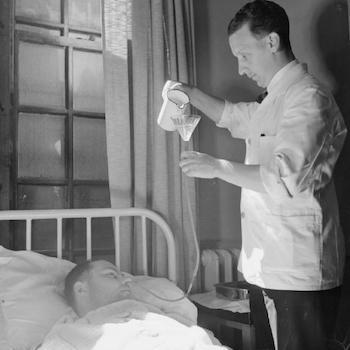A leading public health authority recently denounced Netflix for its series featuring Gwyneth Paltrow and her company Goop, which sells magical elixirs and other pseudoscientific garbage. The authority said the series poses a "considerable health risk" because it spreads "misinformation."
Who said it? The FDA? The CDC? The Department of Health and Human Services? Nope, none of those. The comments, reported by the BBC, were made by Simon Stevens, chief executive of England's National Health Service (NHS).
Paltrow is an American celebrity, and Goop is an American company. So why do Americans have to rely on the British to tell the truth about America's most famous scam artist? Why are U.S. public health officials afraid of doing their jobs?
NHS Gets Vaping Right
This isn't a one-off example. The British are also following the scientific evidence on vaping, while American health authorities are actively undermining it.
On its website, the NHS says that e-cigarettes are "effective in helping people quit smoking" and "95% safer than smoking." (We would say "less harmful" rather than "safer.") That is why at least two hospitals in the UK have vaping shops inside; doctors would rather have patients who vape than patients who smoke.
American public health officials, on the other hand, are acting like e-cigarettes are only slightly less evil than crack cocaine. The CDC recommended that people avoid e-cigarettes entirely (even smokers who wanted to quit), then had to walk back that ridiculous position a few months later. Other American health agencies, like the one in King County (Seattle area), are pushing the myth that cigarettes and e-cigarettes are basically the same. Not only is that thoroughly unscientific, it is dangerous and lethal advice.
UK Also Implements Cutting-Edge Reproductive Technology
Another area in which English health officials are beating Americans is in reproductive technology. Some women suffer from mitochondrial disease, which can be passed on to their children. (Mitochondria are the "powerhouses" of the cell.) When sperm and egg fuse, the resulting zygote inherits all of its mitochondria from the mother, not the father. Thus, if a healthy egg can be substituted for the mother's faulty egg, this would allow women with mitochondrial disease to safely bear children.
A technique that produces what is colloquially known as a "three-parent embryo" does just that. A healthy woman donates an egg, the nucleus of which is removed and replaced with a nucleus from the mother's egg. Then, the father's sperm is added, and the healthy embryo is implanted into the mother's uterus. In 2016, the world's first baby was born using this procedure.
And yet, it's still illegal in the United States. According to Stat:
The embryos cannot be transferred into a woman’s uterus because of a 2015 congressional amendment that forbids the Food and Drug Administration from considering human research applications “in which a human embryo is intentionally created or modified to include a heritable genetic modification.”
It's clear that, on some of the most controversial issues, UK health authorities simply have more guts than their American counterparts. What a shame.




